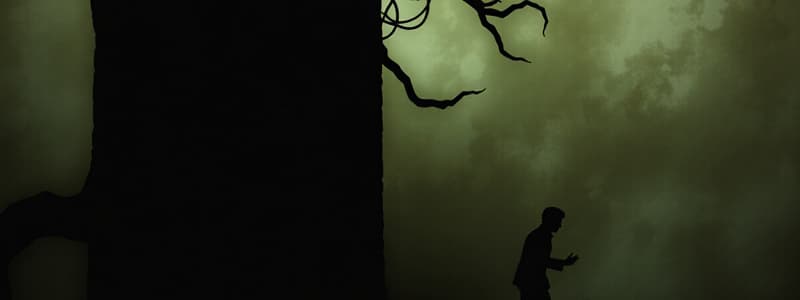Podcast
Questions and Answers
What does the narrator claim sharpened his senses?
What does the narrator claim sharpened his senses?
- A disease (correct)
- Fear
- Madness
- Love
What specific aspect of the old man bothers the narrator?
What specific aspect of the old man bothers the narrator?
- His age
- His wealth
- The old man's actions
- His pale blue eye (correct)
How does the narrator describe his mental state regarding the murder he plans?
How does the narrator describe his mental state regarding the murder he plans?
- Calm and collected (correct)
- Indifferent
- Frightened
- Excited
For how long does the narrator watch the old man before committing the act?
For how long does the narrator watch the old man before committing the act?
What does the narrator use to open the old man's door at night?
What does the narrator use to open the old man's door at night?
How does the narrator perceive the idea of murder that he has conceived?
How does the narrator perceive the idea of murder that he has conceived?
What does the narrator do with the lantern during his nightly visits?
What does the narrator do with the lantern during his nightly visits?
How does the narrator describe the way he enters the old man's room?
How does the narrator describe the way he enters the old man's room?
What primarily disturbed the narrator, causing him to act with such caution each night?
What primarily disturbed the narrator, causing him to act with such caution each night?
What action did the narrator take each night at midnight?
What action did the narrator take each night at midnight?
What was the old man's initial reaction when he sensed a presence in the room?
What was the old man's initial reaction when he sensed a presence in the room?
What does the narrator attribute to his own feelings of triumph?
What does the narrator attribute to his own feelings of triumph?
How did the narrator feel about the sound of the groan he heard from the old man?
How did the narrator feel about the sound of the groan he heard from the old man?
What did the old man do upon being startled awake?
What did the old man do upon being startled awake?
What emotion did the narrator frequently experience during the nights he watched the old man?
What emotion did the narrator frequently experience during the nights he watched the old man?
What does the narrator imply about the old man's wisdom?
What does the narrator imply about the old man's wisdom?
What action did the narrator take to conceal the old man's corpse?
What action did the narrator take to conceal the old man's corpse?
What was the narrator's state of mind while he was carrying out the concealed murder?
What was the narrator's state of mind while he was carrying out the concealed murder?
What sound troubled the narrator after the murder?
What sound troubled the narrator after the murder?
What did the narrator do just before the police arrived?
What did the narrator do just before the police arrived?
Which statement best describes the old man's condition after the narrator's actions?
Which statement best describes the old man's condition after the narrator's actions?
How did the narrator feel about the police searching his home?
How did the narrator feel about the police searching his home?
What precaution did the narrator initially take to avoid suspicion?
What precaution did the narrator initially take to avoid suspicion?
What ultimately happened to the narrator after he believed he had successfully concealed his crime?
What ultimately happened to the narrator after he believed he had successfully concealed his crime?
What had been growing upon the old man ever since the first slight noise?
What had been growing upon the old man ever since the first slight noise?
What was the narrator trying to illuminate with the lantern?
What was the narrator trying to illuminate with the lantern?
How does the narrator describe the old man's eye?
How does the narrator describe the old man's eye?
What comparison does the narrator use to describe the sound of the old man's heart?
What comparison does the narrator use to describe the sound of the old man's heart?
What emotion does the narrator experience as he waits?
What emotion does the narrator experience as he waits?
What did the old man try to convince himself about the noises?
What did the old man try to convince himself about the noises?
What ultimately drives the narrator to madness?
What ultimately drives the narrator to madness?
How does the narrator feel about the old man?
How does the narrator feel about the old man?
What action does the narrator take in response to the ringing sound he hears?
What action does the narrator take in response to the ringing sound he hears?
How does the narrator first perceive the sound that he hears?
How does the narrator first perceive the sound that he hears?
What does the narrator attribute his growing discomfort to?
What does the narrator attribute his growing discomfort to?
What emotional state does the narrator experience as the sound increases?
What emotional state does the narrator experience as the sound increases?
What is the narrator's ultimate reaction to the situation?
What is the narrator's ultimate reaction to the situation?
What does the sound resemble according to the narrator's description?
What does the sound resemble according to the narrator's description?
What action does the narrator take to try to distract himself from the sound?
What action does the narrator take to try to distract himself from the sound?
What does the narrator accuse the officers of during his breakdown?
What does the narrator accuse the officers of during his breakdown?
Flashcards are hidden until you start studying
Study Notes
The Tell-Tale Heart: Key Facts and Analysis
- The narrator is obsessed with killing an old man because of his "vulture eye"
- The narrator carefully plans the murder, even visiting the old man every night for a week, making sure to act normal
- The narrator meticulously avoids leaving any trace of the crime
- The narrator is confident in his ability to hide the body
- The narrator's guilt intensifies as he hears the old man's heart beating underneath the floorboards, convinced that the police have also heard it.
- The narrator's escalating anxiety is a key theme in the story, driving him to a point of madness where he confesses to the crime
- The story is famous for its psychological horror, exploring the narrator's descent into madness through his own words and actions.
- The narrator's internal conflict between his rational planning and his overwhelming guilt and paranoia ultimately leads to his downfall
- The story's ending is a classic example of Poe's signature style; a shocking climax driven by the narrator's internal torment.
The Narrator's Character
- The narrator's sanity is a key question throughout the story
- The narrator is quick to defend his sanity, but his detailed, obsessive account raises doubt
- The narrator's obsession with the old man's eye reveals his paranoia and his struggle with his inner demons
- The narrator's detailed, precise account of his actions highlights his careful planning and meticulous nature
- The narrator's actions are driven by a combination of fear, obsession, a desire to rid himself of the old man's eye, and a feeling of intellectual superiority
Style and Theme
- The story is written in a confessional tone, inviting the reader into the narrator's mind
- The narrator's relentless, almost manic energy, creates a sense of unease & suspense
- The story uses vivid, precise language, highlighting the narrator's heightened senses and his meticulous approach
- The story delves into themes of guilt, paranoia, obsession, and the fragility of sanity
- The story explores the psychological impact of a crime, demonstrating how guilt and paranoia can completely consume a person.
Studying That Suits You
Use AI to generate personalized quizzes and flashcards to suit your learning preferences.




